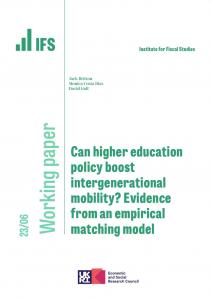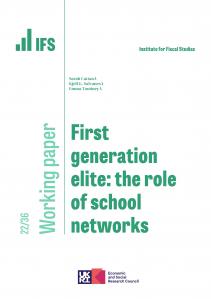We know that higher education provides a significant boost to earnings. But when considering future family income, other aspects matter too: how many hours graduates work, who they partner and how much tax they pay.
New research, published today by the Institute for Fiscal Studies, shows that by age 42 completing higher education had the following effects on women born in 1970:
- It increased women’s net family income by around 20% (around £9,500 per year). Women see a similar boost in their net family income in their early thirties as in their early forties – although the reasons why change over the life cycle.
- It increased women’s wages by around 30%, but this effect has diminished for women born more recently. For women born in 1958, higher education boosted wages by almost 40%.
- Higher education increased the likelihood women worked in their early thirties, but there was no impact on the likelihood of working in their early forties. This reflects the fact that higher education causes women to delay childrearing until later in their careers.
- Overall, the combined impact on wages and hours of work meant that getting a degree increased women’s own gross earnings (including self-employment income) by around £7,900 per year. This is smaller than the effect on earnings in their early thirties which were increased by £10,700 per year. The impact at both ages for women born in 1970 is around 50% larger than for women born 12 years earlier.
- Higher education increased the likelihood women found a partner who also had a degree by 20 percentage points. As highly-educated partners typically earn more, this increases gross partner earnings in the household by around £5,200 per year. This effect is smaller at younger ages. The wages of male graduates tend to continue growing relative to the wages of both non graduates and female graduates as they enter their 40s.
- The progressive tax and benefit system reduces the returns to higher education. As higher education increases the earnings of graduates and their partner it also increases the amount of tax they pay and reduces the benefits they receive. Graduating from higher education increases the amount of tax women pay at age 42 by £3,500, on average, and reduces their benefit income by around £700.
Chris Belfield, co-author of the paper and a Research Economist at IFS, said:
“Universities play an important role in determining the future earnings of their graduates, but their impacts go far beyond this. Since female graduates are much more likely to marry men with a degree going on to university not only raises their own future earnings it raises the amount they can expect future partners to earn. Accounting for this effect of higher education matters when considering the wider impact of attending university on living standards and social mobility.”










